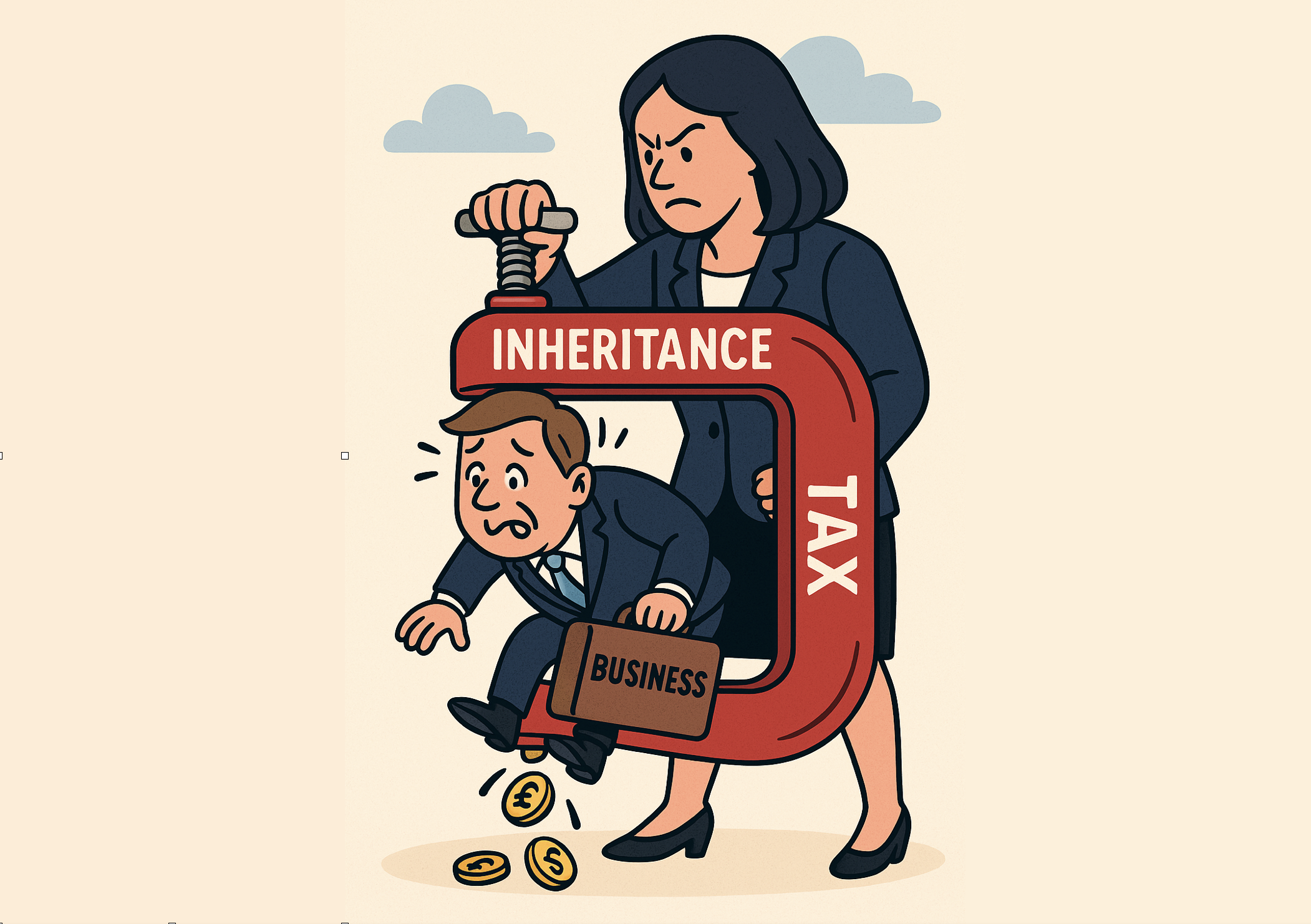Easy Way to Settle the New Inheritance Tax Charge on Business Shares
Published
13 October 2025 | 6 min read
Article Summary
Paying Even More Tax? Surely Not…
For many business owners, the idea of paying yet more tax feels almost laughable. Between
Corporation Tax, Income Tax, and Dividend Tax, it can seem like there’s little left to give.
Yet with new inheritance tax rules targeting company shares, the question becomes
clear: how can we protect the value of our business — and our family’s future — from
yet another tax hit?
Setting the Scene: What’s Changing with Business Relief
Up to now, most shares in UK trading companies have qualified for 100% Business Relief,
meaning they could usually be passed on free from Inheritance Tax (IHT). This has long been
one of the few real tax advantages for business owners — recognising that a trading company
isn’t just an investment, but often the owner’s life’s work.
However, that’s about to change. Under the government’s new proposals, only the first £1
million of qualifying business assets per person will continue to receive full (100%) relief.
Anything above that will only get 50% relief, meaning that a 20% IHT charge (half the
usual 40% rate) will now apply on the excess.
In simple terms, if your business shares are worth £3 million, the first £1 million would
remain fully exempt, while the remaining £2 million would face a potential £400,000
inheritance tax bill.
For many business owners, that’s a major shift — and one that could significantly impact
how family-owned companies are passed down in future.
Why This Change Could Create Real Problems for Business Owners
One of the biggest challenges with the new inheritance tax rules is how the tax will actually
be paid.
When a business owner passes away, the value of their shares is included in their estate for
IHT purposes. Under the new system, any shares above the £1 million threshold could attract
a 20% tax charge.
The problem? That tax bill falls on the shareholder’s estate or family — not the business
itself.
If the family doesn’t have the spare cash to settle the liability, they could be forced to sell
part (or even all) of the company just to pay the tax. In some cases, that could mean losing
control of the business entirely or — worse — pushing it into financial distress if funds are
drawn directly from the company to cover the bill.
In short, a tax that was meant to be “manageable” could end up destroying the very
businesses it targets.
That’s why it’s now essential for business owners to have a back-up plan in place —
something that ensures the tax can be settled quickly and efficiently, without putting the
company or family finances at risk.
An Easy Way to Settle the New Inheritance Tax Charge
The good news is that there’s a simple, cost-effective way to deal with this new inheritance
tax exposure — life insurance.
Using our earlier example, where a £3 million business creates a potential £400,000 IHT bill,
the company can take out a life insurance policy on the shareholder for £400,000 — the
value of the expected tax liability.
If the shareholder were to pass away, the policy would pay out that amount tax-free to the
family (usually through a trust structure). The family can then use those funds to settle the
inheritance tax due to HMRC, ensuring the shares — and the business — can be transferred
smoothly, without disruption or forced sale.
It’s a straightforward solution that keeps everyone whole:
– HMRC receives the tax it’s owed.
– The family inherits the company shares fully paid up.
– The business continues trading without financial strain.
This approach turns what could be a serious cashflow crisis into a planned, manageable
event, ensuring the family’s legacy and the company’s stability are both protected.
Making It Even More Tax-Efficient
One of the best parts of this strategy is that it doesn’t just protect the business and the family
— it can also be highly tax-efficient for the company itself.
By using a Relevant Life Policy to fund the potential inheritance tax bill, the business can
pay the premiums directly. These premiums are usually treated as an allowable business
expense, meaning the company can claim Corporation Tax relief on them.
At the same time, there’s no Benefit-in-Kind charge for the shareholder who is covered by
the policy. In other words, the company gets tax relief on the cost, and the individual doesn’t
face any additional personal tax.
So not only does the arrangement help make the shares effectively inheritance-tax-free for
the family, but it also helps the business save tax on the premiums — creating efficiencies
on multiple levels.
Surprisingly Affordable Protection
Many business owners are often surprised by just how cost-effective this kind of protection
can be.
For example, a 45-year-old male shareholder taking out a £400,000 life policy to cover the
potential inheritance tax bill might pay around £40 per month for the cover.
Because the policy can be set up as a Relevant Life Policy, the company pays the
premiums and can usually claim Corporation Tax relief (currently at 25%). That means
the effective cost to the business falls to roughly £30 per month.
So, for the price of a few cups of coffee each month, the business can:
– Ensure the family won’t face a six-figure tax bill,
– Keep the company secure and trading, and
– Benefit from tax relief on the premiums.
It’s a small monthly cost that delivers huge peace of mind — protecting both the business and
the family legacy.
Planning Ahead with Executive Life
At Executive Life, we specialise in helping business owners protect what they’ve worked
hard to build. Our focus is on finding smart, tax-efficient ways to use life insurance to solve
real financial challenges — from succession planning to the new inheritance tax rules on
company shares.
The upcoming changes to Business Relief will reshape how family-owned companies are
passed on. But with the right planning in place, you can ensure your business remains in your
family’s hands, not HMRC’s.
If you’re concerned about how the new inheritance tax rules could affect your company, get
in touch with our team. We’ll help you explore the best protection options for your situation
— ensuring your family’s future and your business legacy are both secure.



